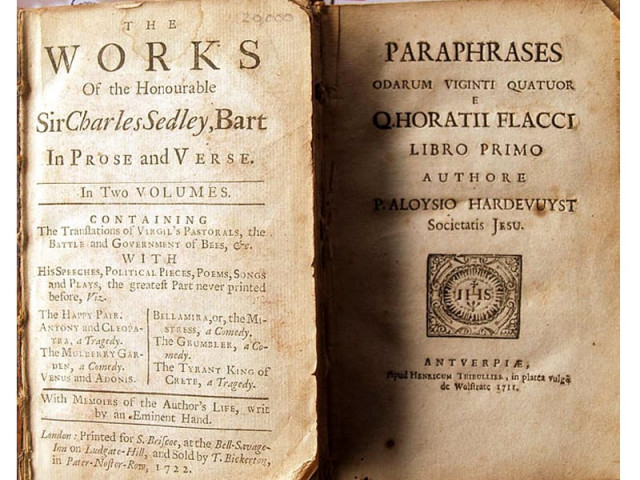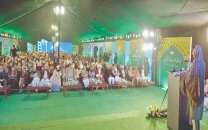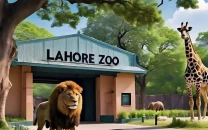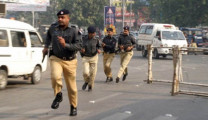Out-of-print: Not all books are created equal
Rare book sellers say there is a limited clientele for their wares.

“Each book here carries with it a history … . The older it is, the richer the history,” said Haroon Siddiqui adding, however, that not all old books are ‘rare’ and ‘antique’. “The books should be significant, either because of the author, the content or the publishing date.”
Haroon Siddiqui, owner of Siddiqui Rare and Antique Books, said that even relatively new books can be rare. Siddiqui indicated a copy of Sadequain, The Holy Sinner, the first edition of which was published in 2002. The last time it was published was in 2003. The 20 kg tome cost Rs20,000 in 2003. The book was published by the Mohatta Palace Museum and is now worth Rs125,000. Siddiqui said the book was out of print and only 1,200 copies were printed in 2003.
Saiddiqui’s staff verifies the books online for their authenticity. “I have collected books from libraries and from personal collections,” he added.
Most of Siddiqui’s clients are businessmen and civil servants. Price, Siddiqui said, is not an issue. “They mostly have knowledge about the books they want,” he said adding that original editions and autographed books were highly sought after. Several books are paid for in installments, he said.
Siddiqui’s was one of the two rare book stalls at the Lahore International Book Fair held from February 3 to 7 at the Expo Centre. He said he had managed to sell books worth Rs200,000 and still had more payments to receive.
Siddiqui said he tried to maintain the original cover and binding. “In Pakistan, very few people can repair original bindings. We do not alter bindings, till the book is sold and unless the customer requests us to.” Siddiqui said that books from the 18th century do not require much effort to be preserved. “Paper in those days was hand made. It was very resilient unlike the chemically treated paper of modern times.”
Mohammad Nazir, owner of a 20-year-old book business in Dharampura, said he purchased antique books from small retailers of old books and papers. “There is a shortage of people who are truly aware of the worth of old books,” Nazir said. Nazir said at times it was pure luck that helped him find something rare. “We usually land up with old books when someone dies and their family gives off their old books and papers,” but Nazir said usually it was the paper waste market he headed for to seek old books.
Nazir Old Book Shop was established in 1992 and generally deals with text books both used and new. In 1996, Nazir set up a roadside book stall at the Anarkali Sunday Bazaar. “There I was asked for old books or first editions,” he recalls. “That’s how I realised the worth of these books.” Having recently participated in the Book Fair, Nazir said exposure was essential to creating awareness about rare books.
At the Sunday Bazaar, which starts right after Fajr and ends before sunset, Nazir sets up his collection of antique and rare books every week. Having mostly sold kalmi kitabaain (hand-written books), Nazir says they have a character of their own. So far the most expensive book he has sold is Dalael-ul-Khairaat for Rs70,000. Nazir believes pricing should be rational. “I do not believe in deceiving my customers,” he said. “At times, even I am not aware of the true worth of a book, but it’s all part of the deal.”
Nazir also takes pride in collecting and selling old newspapers. “They tell tales,” he said. He has bundles of newspapers dating back to 1923, Nazir said, “They are worth a lot but it’s also very difficult to get hold of them in good condition.”
Nazir fears that the business is at the risk of extinction. “No government or institution has tried to preserve this sort of literature,” he said adding “this is knowledge and it is dying.” “People in Pakistan rarely show interest. When they do, they do not want to pay for it,” he said. Appreciating Haroon Siddiqui, Nazir hopes people like him can lead the way forward.
“When we seek help, people propose re-publishing out-of-print literature,” said Siddiqui. He believes the content rarity is lost while increasing the production of such literature. “New editions always lose some part of the original edition,” he said.
“You need a lot of investment to expand,” Siddiqui said hinting about his future, “books are already expensive, I really am left with no money to invest elsewhere.”
Published in The Express Tribune, February 12th, 2012.



















COMMENTS
Comments are moderated and generally will be posted if they are on-topic and not abusive.
For more information, please see our Comments FAQ